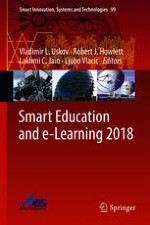2019 | OriginalPaper | Chapter
Enhancing Students’ Involvement in the Process of Education Through Social Applications
Authors : Miloslava Cerna, Anna Borkovcova
Published in: Smart Education and e-Learning 2018
Publisher: Springer International Publishing
Activate our intelligent search to find suitable subject content or patents.
Select sections of text to find matching patents with Artificial Intelligence. powered by
Select sections of text to find additional relevant content using AI-assisted search. powered by
